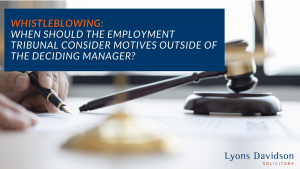
In a whistleblowing case when should the Employment Tribunal consider motives outside of the deciding manager?
This question was considered by the Employment Appeal Tribunal (“EAT”) in University Hospital North Tees & Hartlepool NHS Foundation Trust v Fairhall[1]. The focus of the Trust’s appeal was whether the Employment Tribunal ought to have considered the thought-processes of other managers not involved in the decision-making process, particularly in circumstances where the employer failed to show a fair reason for the dismissal.
Background to Fairhall
Ms Fairhall was employed by the Trust as a clinical care co-ordinator who, in addition to her normal nursing duties, was responsible for risk management and highlighting safeguarding concerns. Between 21st December 2015 and 21st October 2016 Ms Fairhall made thirteen protected disclosures to several senior managers in the Trust’s hierarchy. The complaints principally concerned staffing levels and the effect this was having on patient safety.
On 31st October 2016 Ms Fairhall was suspended pending an investigation into allegations of gross misconduct. Crucially, the decision to suspend and instigate an investigation was taken by three senior managers who had also dealt with Ms Fairhall’s protected disclosures, although they were not involved in the later decision to dismiss. Following an investigation Ms Fairhall was dismissed for gross misconduct, a decision upheld following an internal appeal.
Decision of the ET
Ms Fairhall argued before the ET that the dismissing manager (i.e. the decision-maker) was influenced by the senior managers who dealt with her protected disclosures, and the reason for the dismissal was because of the disclosures. Dismissal for making a protected disclosure is prohibited by virtue of section 103A Employment Rights Act 1996, therefore Ms Fairhall’s contention was that the dismissal was automatically unfair. The Trust argued that the decision to dismiss was because of Ms Fairhall’s dishonesty and was in no way influenced by her protected disclosures. The ET disagreed and was particularly critical due to the lack of a finding of dishonesty being recorded in the dismissal letter or evidence and the dismissing manager’s evidence on this point.
The ET found it likely that the task of investigating Ms Fairhall, instigating disciplinary proceedings and ultimately dismissing her, were influenced by the Trust’s hierarchy and therefore was appropriate to attribute their motivation to the decision-maker. The ET was therefore satisfied that the reason or principal reason for Ms Fairhall’s dismissal was that she had made protected disclosures and therefore, the dismissal was automatically unfair.
Appeal to the EAT
The Trust appealed on the basis that the ET had erred in drawing an inference as to the reason for the dismissal because of the unexplained conduct of the senior managers involved in the suspension. Relying on the Supreme Court’s decision in Royal Mail Group Ltd v Jhuti[2] (where the Supreme Court unanimously held that knowledge of whistleblowing can be imputed where the dismissing manager was unaware), the Trust’s suggestion was that the ET should have examined the motives of the senior managers rather than only considering the thought-process of the dismissing manager.
In rejecting the Trust’s appeal, the EAT found that Fairhall was not a Jhuti type case because the dismissing manager knowingly dismissed Ms Fairhall for the principal reason she had made protected disclosures. Jhuti would only apply in the situation where the real reason to dismiss an employee is hidden from the decision maker behind the mask of a fictitious reason. This would usually occur in circumstances where the hierarchy of responsibility have an ulterior motive for dismissing an employee.
Therefore, it can be reasonably inferred that it is only in cases where the decision-maker (acting in good faith) dismisses an employee, but is being manipulated by another (or other) manager(s) to dismiss the employee for a fictious reason, should it be necessary to examine the motives of those other managers.
Comment
Notwithstanding the EAT’s primary findings in Fairhall, this case is a timely reminder of the risks employers face if they have an illegitimate motive for dismissing an employee. Not least because of the unlimited amount of compensation the ET can award where the reason or principal reason for the dismissal is found to be because of a protected disclosure.
For further information on this topic please contact Marcus Alvin at [email protected]



